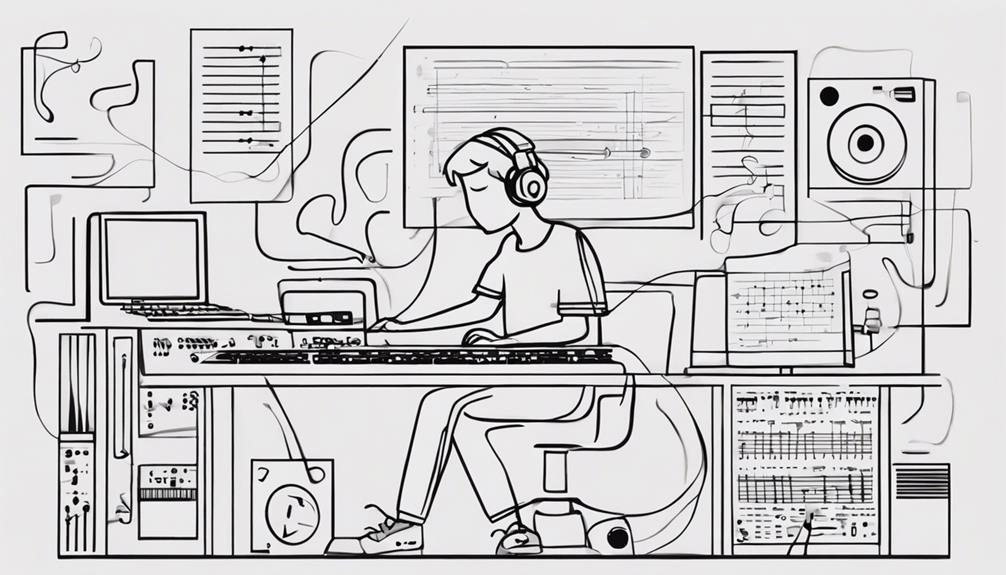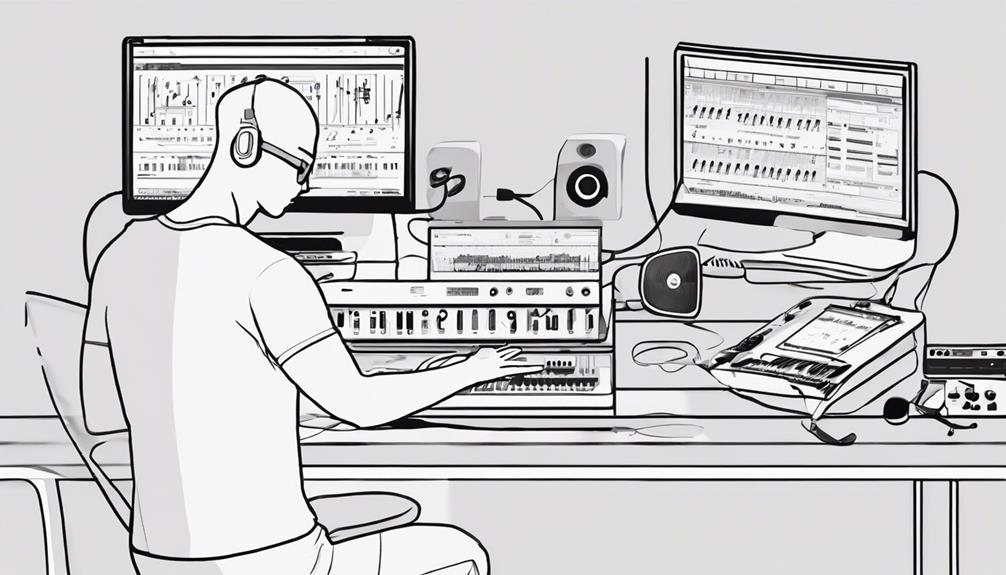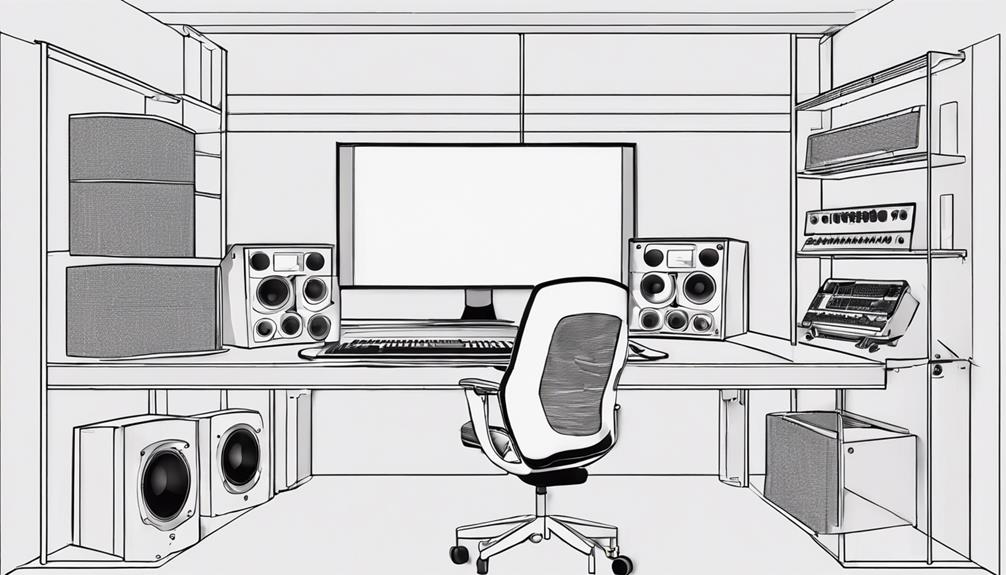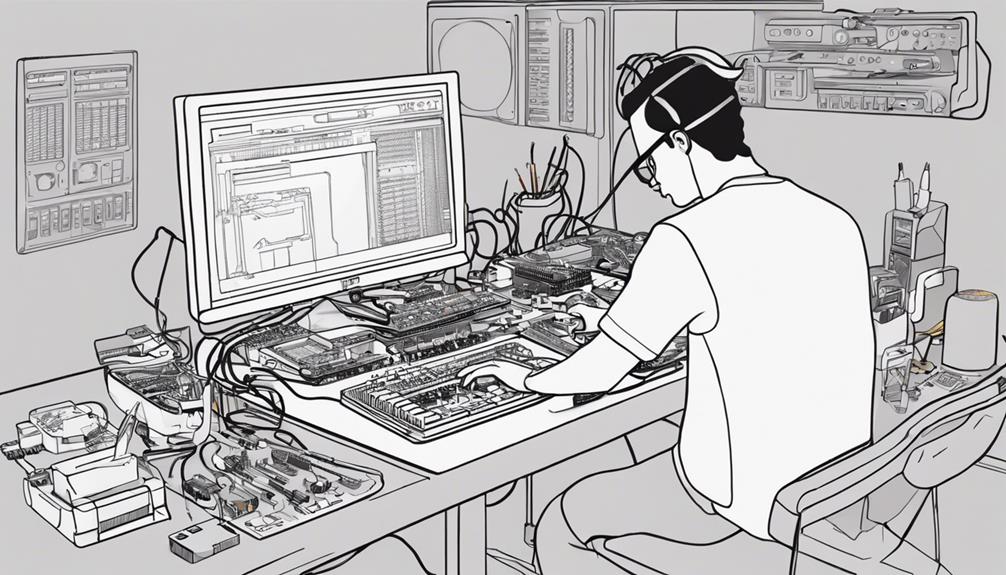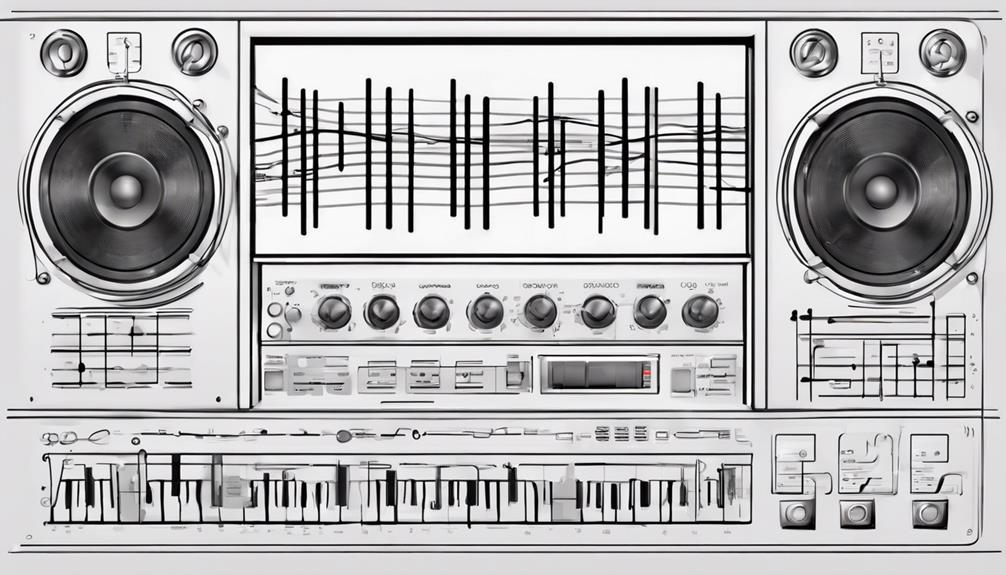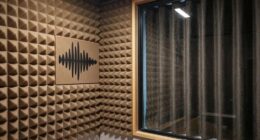To kickstart your music production journey, start by investing in essential gear like a computer, DAW, headphones, audio interface, MIDI keyboard, virtual instruments, and studio monitors. Get acquainted with popular DAWs such as Ableton Live, Logic Pro X, FL Studio, or Studio One for producing your tracks. Learn recording techniques, MIDI basics, and virtual instruments for creative flexibility. Master audio editing, mixing, and mastering fundamentals to enhance your sound quality. Equip yourself with must-have equipment, set up a home studio, and hone essential skills in music theory, sound design, and DAW operations to perfect your craft. Ready to make music?
Key Takeaways
- Invest in essential gear: computer, DAW, headphones, audio interface, MIDI keyboard, and studio monitors.
- Choose beginner-friendly DAW software like Ableton Live, Logic Pro X, FL Studio, or Studio One.
- Learn music theory basics for sound structure guidance.
- Develop skills in sound design, critical listening, mixing, and mastering.
- Utilize online resources, tutorials, forums, and workshops for continuous learning.
Overview of Music Production
Explore the fundamental aspects of music production in this extensive overview. Music production encompasses various stages such as recording, mixing, and mastering to craft a polished final track.
A key tool in this process is the Digital Audio Workstation (DAW), which serves as the central hub for all production tasks. Understanding music theory is important for creating harmonious compositions and guiding the overall sound and structure of the music.
When diving into music production, having the right equipment is essential. An audio interface connects your instruments and microphones to the computer, allowing for high-quality recording. Virtual instruments expand your sonic palette, offering a wide range of sounds to incorporate into your tracks.
Studio monitors are essential for accurate sound reproduction, ensuring you can hear your music with precision and clarity.
Mastering the stages of production, from session setup to final mastering, is key to achieving professional-quality results. By honing your skills in recording, mixing, and mastering, you can elevate your music production to the next level.
Essential Gear for Beginners
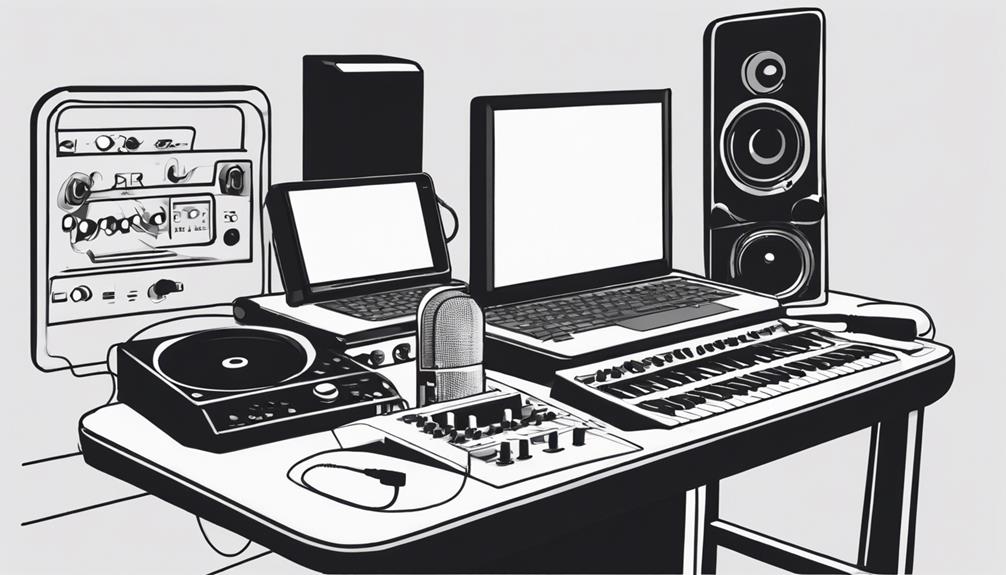
You're ready to start your music production journey, and the essential gear for beginners is vital. From basic equipment needs to budget-friendly options, there's a range of choices to suit your needs.
Let's explore beginner-friendly software and other tools to kickstart your music production adventure.
Basic Equipment Needed
You'll need essential gear like a computer, Digital Audio Workstation (DAW), and quality headphones to kickstart your music production journey as a beginner.
An Audio Interface is vital for connecting microphones and instruments to your computer for recording purposes. Additionally, MIDI keyboards can enhance your creative input and control over virtual instruments within your DAW.
Speaking of virtual instruments, these software-based tools are essential for creating music tracks within your production software. To guarantee accurate playback and mixing, investing in studio monitors, which are specialized speakers, is highly recommended.
Besides, having a quality microphone is crucial for recording vocals or acoustic instruments. Remember, your computer will serve as the backbone of your music production setup, so make sure it meets the necessary technical requirements.
Budget-Friendly Options
For beginners looking to start their music production journey on a budget, consider opting for cost-effective essential gear that provides quality without breaking the bank.
When setting up your home studio, an entry-level audio interface like the Focusrite Scarlett 2i2 offers high-quality audio recording capabilities at an affordable price point.
Pair this with budget-friendly studio headphones such as the Audio-Technica ATH-M50x for accurate sound monitoring during production sessions.
For hands-on control of virtual instruments and software synths, consider investing in an entry-level MIDI controller like the Akai MPK Mini.
When it comes to capturing vocals and instruments, a condenser microphone like the Audio-Technica AT2020 delivers clear and detailed sound without costing a fortune.
To kickstart your music production journey, take advantage of free DAW software options like Garageband for Mac or Cakewalk by BandLab for Windows, providing essential tools for recording, editing, and mixing tracks without the added expense.
Beginner-Friendly Software
To equip yourself for music production as a beginner, focus on acquiring beginner-friendly software that complements your essential gear like basic studio headphones, a USB audio interface, and a MIDI keyboard. When starting out, consider using free software options such as Audacity for audio editing and LMMS for music production. These tools are perfect for beginners as they offer a free trial and are user-friendly. Additionally, Digital Audio Workstations (DAWs) like Garageband, Ableton Live Intro, or FL Studio Fruity Edition are great choices for those just starting. These DAWs provide software instruments for you to create music using virtual instruments. Remember, it's essential to learn the basics of music production before investing in expensive gear or software. Online tutorials and forums can be valuable resources in your journey to learn how to use this software effectively.
| Software | Features | Availability |
|---|---|---|
| Audacity | Audio Editing | Free |
| LMMS | Music Production | Free Trial |
| Garageband | Beginner-Friendly | Paid |
Introduction to DAWs
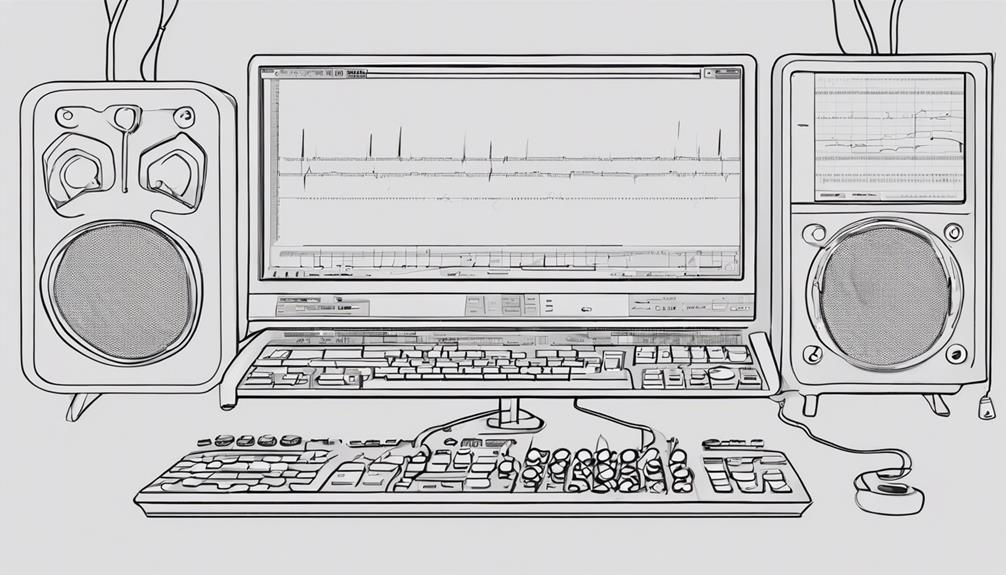
When diving into the world of music production, familiarizing yourself with Digital Audio Workstations (DAWs) is vital. DAWs like Ableton Live, Logic Pro X, FL Studio, and Studio One are powerful software applications that enable beginners to create music.
These platforms offer a wide range of virtual instruments and audio effects, providing you with the tools needed to experiment with different music production techniques.
Whether you're arranging tracks, applying effects, mixing, or mastering songs, DAWs serve as your creative hub. They allow you to bring your musical ideas to life and explore the endless possibilities of music production.
For beginners, learning to navigate and utilize DAWs efficiently is an essential step towards honing your production skills. Embrace the capabilities of these software applications, and let your creativity flow as you start on your music production journey with DAWs at your fingertips.
Recording Techniques 101
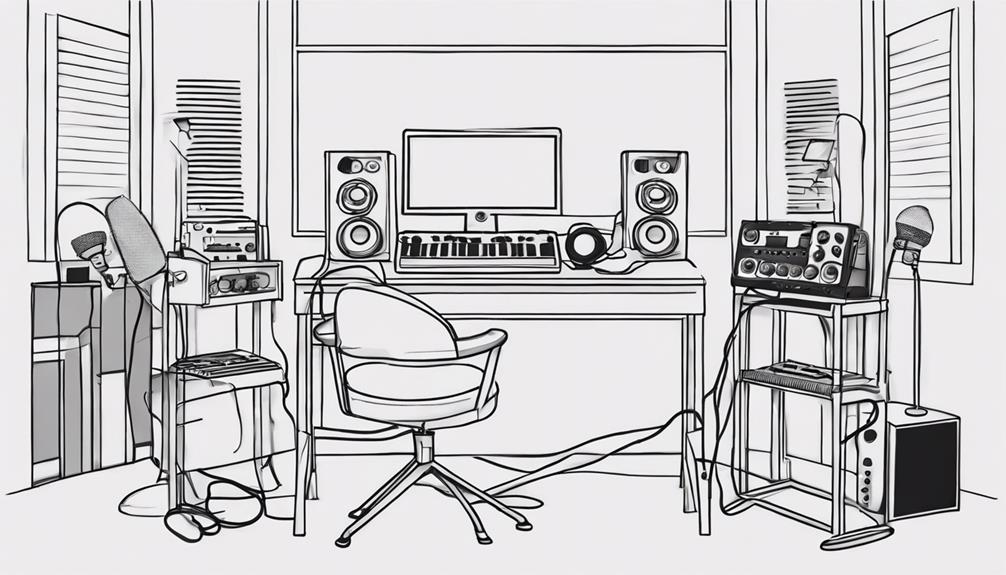
Start by mastering essential recording techniques to capture professional-quality audio for your music production projects. When it comes to recording sessions, consider whether general sessions or tracking individual instruments best suit your needs.
To kick off your recording process, start with drums, then move on to bass and lead instruments to establish a strong foundation for your track. While tracking individual instruments may be more time-consuming, it provides greater control and flexibility during the editing process.
Pay close attention to microphone placement, room acoustics, and levels to make sure you capture clean and high-quality audio, enhancing the overall sound of your recordings. Experimenting with these elements will help you achieve the best audio quality for each instrument and vocal track, setting you up for success in the editing process.
MIDI and Virtual Instruments
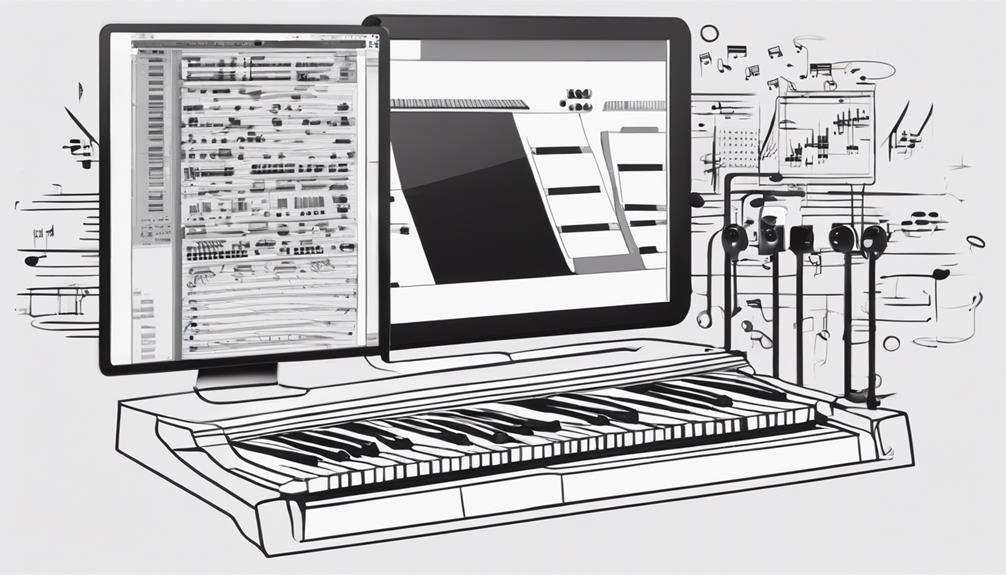
Mastering essential recording techniques paves the way for seamlessly incorporating MIDI and virtual instruments into your music production workflow.
MIDI, which stands for Musical Instrument Digital Interface, facilitates digital communication between various musical devices such as keyboards, controllers, and software instruments. This digital protocol enables precise control over virtual instruments, allowing for flexible sound creation and manipulation within your productions.
Virtual instruments are software-based tools that emulate traditional musical instruments like pianos, drums, and synths. They can exist as standalone plugins or be integrated within Digital Audio Workstations (DAWs) for a more streamlined music production process.
Audio Editing Basics
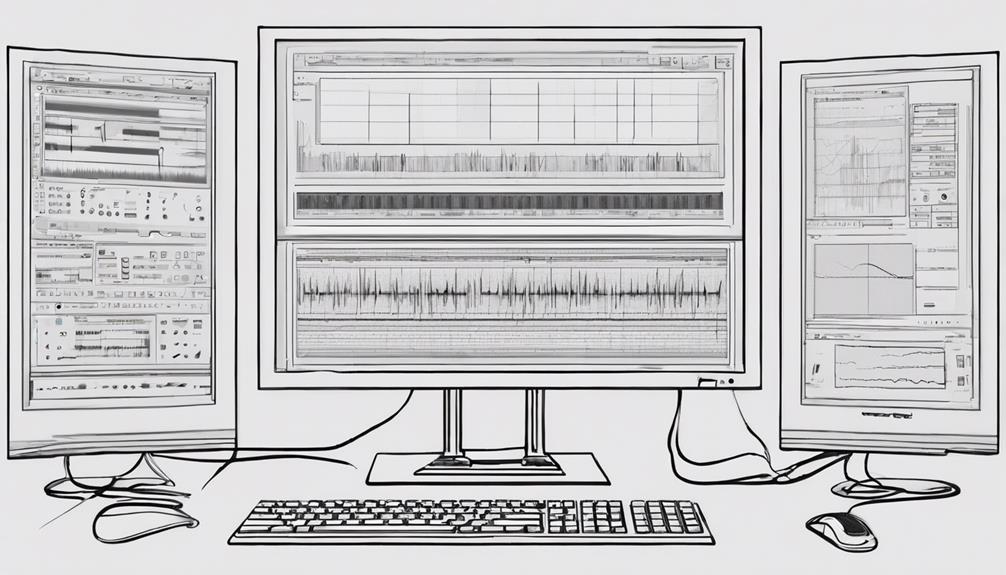
To enhance your music production skills, familiarize yourself with the fundamental principles of audio editing. Audio editing plays an essential role in polishing your recordings, fixing mistakes, and ensuring a high-quality final product.
Here are some essential tips to get you started:
- Use the right software: Choose popular audio editing software like Audacity, Adobe Audition, or Pro Tools to begin editing your recordings effectively.
- Basic editing tasks: Learn to cut, copy, paste, and adjust volume levels to refine your audio recordings.
- Add effects and EQ adjustments: Experiment with adding effects and making EQ adjustments to enhance the sound of your recordings.
- Noise reduction: Utilize noise reduction tools within your software to clean up any unwanted background noise and improve the overall audio quality.
Mastering these audio editing basics will set a strong foundation for your music production journey, allowing you to create professional-sounding tracks.
Mixing and Mastering Fundamentals
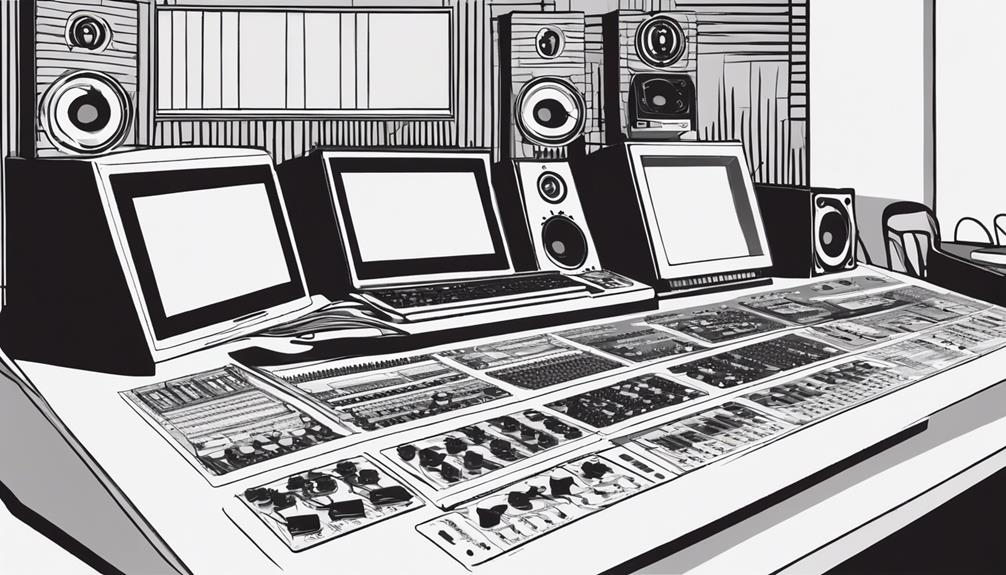
Familiarize yourself with the core concepts of mixing and mastering to elevate your music production skills. Mixing involves balancing and blending individual tracks to create a cohesive sound. Essential tools like volume balancing, stereo panning, EQ adjustments, and effects are key in this process.
On the other hand, mastering is the final step that focuses on enhancing overall quality and preparing the track for distribution. It involves optimizing the volume level and ensuring consistency across various playback systems.
Both mixing and mastering are vital for achieving a professional-quality and polished final product. By mastering these fundamentals, you can guarantee your music production is exceptional and ready for release.
Music Production Process Breakdown
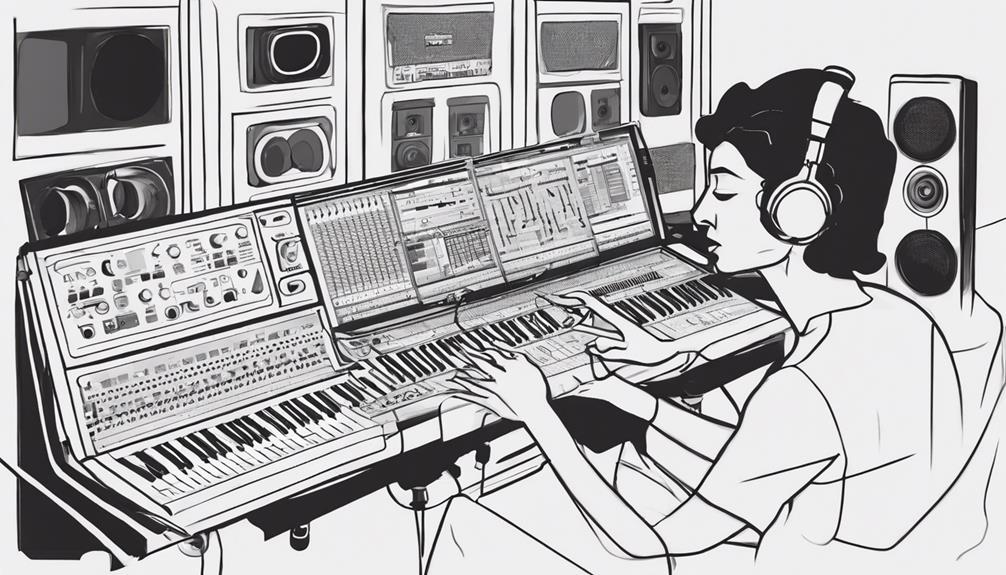
Now let's break down the music production process into key points.
You'll learn about the steps involved in production, the essential equipment you'll need, as well as the critical aspects of editing and mixing.
These elements are vital to creating a polished and professional track.
Steps in Production
Begin by understanding the breakdown of the music production process, which includes songwriting, recording, arranging, mixing, and mastering to craft a polished final track.
- Songwriting:
The initial stage where the composition and lyrics are created, setting the foundation for the entire track.
- Recording:
Involves capturing vocals, instruments, and sounds to bring the song to life.
- Arranging:
Organizing and structuring the different elements of the song to create a cohesive and engaging piece.
- Mixing and Mastering:
Balancing and blending all the recorded tracks in the mix, and then mastering adds the final touches to enhance the overall sound quality.
Each step in the music production process, from the creative process of songwriting to the technical aspects of mixing and mastering, plays a crucial role in shaping the final outcome of a track.
Equipment Needed
To effectively execute the music production process breakdown, you must make sure you have the necessary equipment in place. Key essentials include a computer for running your Digital Audio Workstation (DAW), studio monitors for accurate sound monitoring, microphones for recording, and controllers for enhancing your workflow with virtual instruments.
When selecting microphones, consider the different types available such as condenser and dynamic, each serving specific recording purposes. Additionally, integrating acoustic treatment like foam panels can greatly improve the sound quality of your studio space by reducing unwanted reflections.
Furthermore, investing in quality headphones is important for detailed listening and mixing tasks. These headphones, along with your studio monitors, ensure that you have a reliable reference for your music production.
Remember that the equipment you choose will directly impact the quality of your productions, so it's important to select gear that aligns with your music production goals and budget.
Editing and Mixing
When diving into the music production process breakdown, an essential stage is the editing and mixing phase where audio elements are tightened and balanced to create a cohesive and professional sound. Here are some key points to keep in mind during the editing and mixing process:
- Editing: Focus on tightening the timing and structure of your audio elements to guarantee they flow seamlessly together.
- Mixing: Balance and blend different instruments and sounds within your track to achieve a harmonious sound.
- Volume Adjustment: Pay attention to volume levels to prevent any elements from overpowering or getting lost in the mix.
- Mastering: The final step in the process, mastering enhances the overall sound quality and ensures a polished final product ready for distribution.
Must-Have Equipment for Beginners
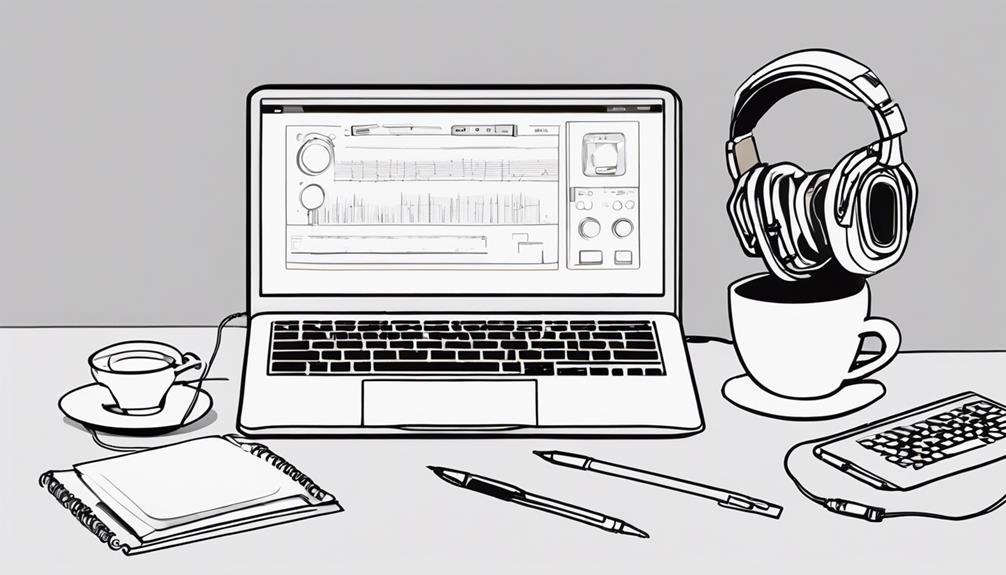
For beginners diving into music production, having the right equipment is essential to kickstart your creative journey effectively. Here are some must-have pieces of equipment for beginners:
| Equipment | Description | Importance |
|---|---|---|
| Computer | Essential for running your DAW (Digital Audio Workstation) software and storing your music projects. | Essential |
| Studio Monitors | Provide accurate sound representation for better mixing and mastering of your music. | Necessary |
| Microphone | Needed for recording vocals and instruments, ensuring high-quality audio input. | Essential |
| MIDI Controller | Enhances creativity and control by allowing you to play virtual instruments and manipulate sounds. | Beneficial |
| Studio Setup | A comfortable and organized space with proper cable management to improve workflow and productivity. | Enhances Efficiency |
Investing in these foundational pieces of equipment will provide you with a solid starting point for your music production journey.
Tips for Beginner Music Producers
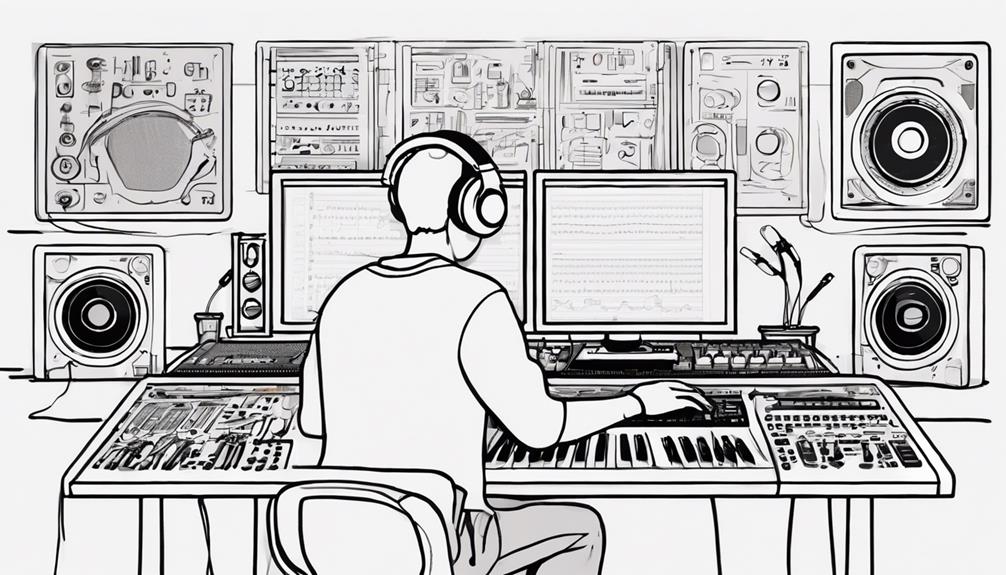
Ready to take your music production skills to the next level? Equip yourself with the essential gear and software, including quality studio headphones and a reliable DAW.
Equipment Essentials
Equip yourself with the essential gear to kickstart your music production journey as a beginner.
To guarantee you have a solid foundation for your studio setup, consider the following equipment:
- Quality Studio Monitors: Invest in reputable studio monitors like KRK Rokits or Yamaha HS5s for accurate sound representation.
- Microphones: Essential for recording vocals and instruments, look into options such as the Rode NT1-A or Shure SM58.
- Acoustic Treatment: Improve sound quality with acoustic foam panels to minimize reflections and echoes in your recording space.
- Cable Management: Maintain a safe and organized workspace by implementing proper cable management techniques to avoid hazards and keep your studio tidy.
Software Selection
Consider starting your music production journey by carefully selecting beginner-friendly software to guarantee a smooth learning experience.
When choosing a Digital Audio Workstation (DAW) to start producing music, look for options like Garageband, FL Studio, or Ableton Live known for their user-friendly interfaces and built-in tutorials. These features can facilitate the initial learning curve and help you grasp the basics quickly.
Opt for software that offers free trials or versions, allowing you to test compatibility and features before making a commitment. Additionally, prioritize DAWs with extensive online support, including community forums and customer reviews, to secure ongoing assistance as you progress.
Software bundles that include virtual instruments, effects, and sound libraries can also provide added value for beginners looking to experiment with diverse sounds. By making an informed software selection, you set yourself up for a solid foundation in music production.
Frequently Asked Questions
How Do Beginners Start Producing Music?
You start producing music by investing in a computer, headphones, and a Digital Audio Workstation (DAW). Learn basic music theory, experiment with loops and samples, and create various songs to practice different techniques. Quantity helps you improve.
Can I Teach Myself Music Production?
You can absolutely teach yourself music production! Immerse yourself in online resources, tutorials, and trial and error. Practice, experiment, and stay dedicated. Self-teaching offers flexibility to learn at your own pace and develop personalized creative techniques.
Can I Be a Music Producer With No Experience?
You can absolutely be a music producer with no experience! Start by immersing yourself in online tutorials, experimenting with different genres, and networking with other producers. Dedication and practice will be your key to success.
How Do Music Producers Get Their Start?
So, you're interested in how music producers get their start? Well, they immerse themselves fully, explore with software, team up with local talent, participate in workshops, intern at studios, and showcase their work online. Immerse yourself!
Conclusion
Now that you have the basics down, remember that music production is like a blank canvas waiting for your creative touch. Immerse yourself, explore, and don't be afraid to make mistakes – that's how you'll learn and grow as a producer. Experiment with different genres, instruments, and techniques to find your unique sound and style. If you’re wondering how to get into music production, start small with accessible software and gear, and gradually build your skills and tools over time. Remember, consistency and passion are key—each track you create is a step closer to mastering your craft.
Keep honing your skills, staying curious and open-minded, and who knows, you might just create something truly magical. Happy producing!

